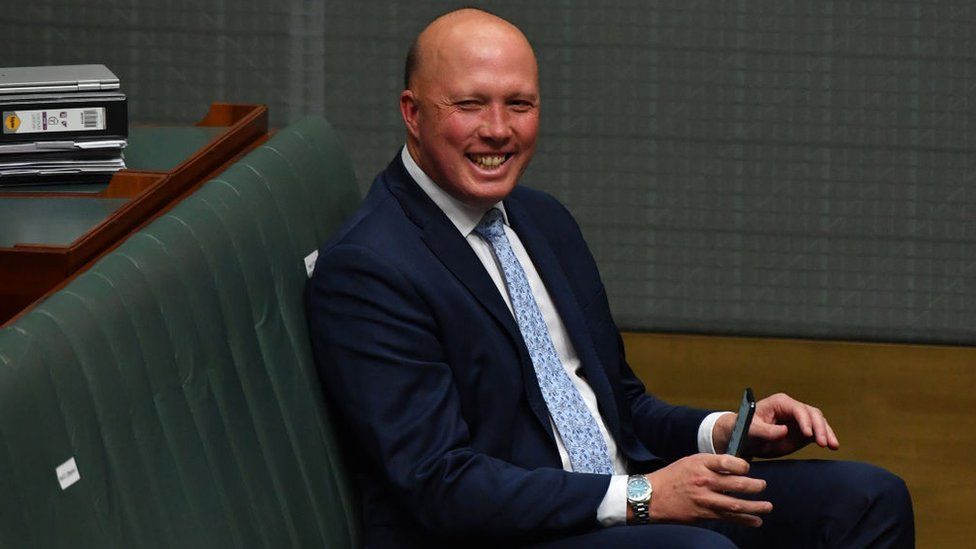The opposition leader, Peter Dutton, has sought to deflect blame for the national energy crisis, saying there is “fault all around” while blaming states for locking up gas reserves.
In a wide-ranging interview on ABC on Sunday, the former defense minister also rejected suggestions that he had relied on classified information to claim Australia could access two new Virginia-class submarines from the US by 2030. He held back support for an Indigenous voice in parliament.
On Saturday, the New South Wales premier, Dominic Perrottet, said an “ideological war” over climate change and national energy policy was largely to blame for the lack of private sector investment in the market, pointing to the divisions within the Coalition on energy policy during the past decade.
But Dutton, a leading conservative who opposed the federal energy guarantee that contributed to Malcolm Turnbull’s loss of the prime ministership, rejected the claim, saying the Coalition had made “huge investments” in renewables.
“There is fault here,” the Liberal leader told ABC’s Insiders program.
“Over a long ple, they have been taking different positions, including state governments.

“We’ve got a huge gas supply in the north and west of this country, in the Labor state in WA. There is the ability for certainty to be put into the energy market.
“We have constraints regarding the gas pipeline bringing gas from north to south, and we’ve got moratoriums in Victoria.”
While he supported more renewables being brought into the electricity market, Dutton also maintained that coal and gas would continue to be part of the energy mix.
“I would love to tell you that there is a battery that can replace a coalmine tomorrow or that we can bring on hydro that can support the rest of the country, but the technology is just not there,” he said.
Despite losing Liberal heartland seats to climate independents across the country, Dutton also said the Liberal and National parties would not support Labor legislation that enshrined the 43% cut in emissions by 2030 and suggested he would likely take a smaller target to the next election.
“We are not supporting [the] legislation and have been clear about that,” he said.
“We believe we will end up … with something like 35%. We had a target of 26-28%. In terms of our target, we will announce that before the next election.”
Dutton also suggested a “sense of panic” on display from the new energy minister, Chris Bowen, while defending the Coalition’s management of the national energy market when it was in government.
“The sense of panic from Chris Bowen that is out there at the moment wasn’t there when Coalition was in government,” Dutton said. “I think he is a bunny in the headlights.”
Host David Speers also pressed Dutton about an article published in the Australian that suggested he had been devising a plan as defense minister to purchase submarines from the US to fill a looming capability gap.
The comments, derided by the defense minister, Richard Marles, as “rank politics”, were greeted with skepticism but also suggestions that Dutton may have leaked classified information if the plan had been canvassed by the government’s nuclear submarine taskforce, which V Adm Jonathan Mead was leading.
Dutton insisted that the remarks had been informed by “his judgment” after he had visited the production line in Connecticut.
“There is nothing top secret in a professional judgment as the former defense minister that I have made. It’s not based on classified information or secrets but my judgment,” he said.
“They [the Americans] are very keen to see the reality in the Indo-Pacific addressed, and so I think that they would pull out every stop to support Australia acquiring the capability as quickly as possible, and that was my judgment.”
On the Indigenous voice to parliament that Labor has promised to deliver as a priority, Dutton said the opposition would wait to see the detail of the proposal before declaring its hand.
“We want to see that detail, and many questions will come from that. I don’t think the public understands yet what the government is proposing,” the Liberal leader said.
He said he wanted to see “practical outcomes” for Indigenous Australians, calling on the prime minister, Anthony Albanese, to prioritize it.
“I want to see the closing of the gap. I want to see a massive reduction in the violence against women and children, particularly the sexual violence against children in Aboriginal communities.”
Labor has pledged to fully implement the Uluru statement from the heart, which also includes establishing a truth-telling Makarrata commission as a first step towards a treaty with Indigenous Australians, along with constitutional recognition of the voice to parliament.
In 2019, Dutton criticized the voice of parliament as a third chamber of parliament, and in 2008 opposed the national apology to members of the Stolen Generations. After becoming leader last month, Dutton said boycotting the apology had been a “mistake”.
The minister for Indigenous Australians, Linda Burney, has urged Dutton to be on the “right side of history” in supporting the voice.
Sign up to receive an email with the top stories from Guardian Australia every morning.
On Sunday, Dutton said it was too early to tell if he would support the proposal.
“I just don’t know what the government’s proposing at the moment other than the headline,” he said.
“I’m happy to support anything that supports reconciliation that does it sensibly.”











